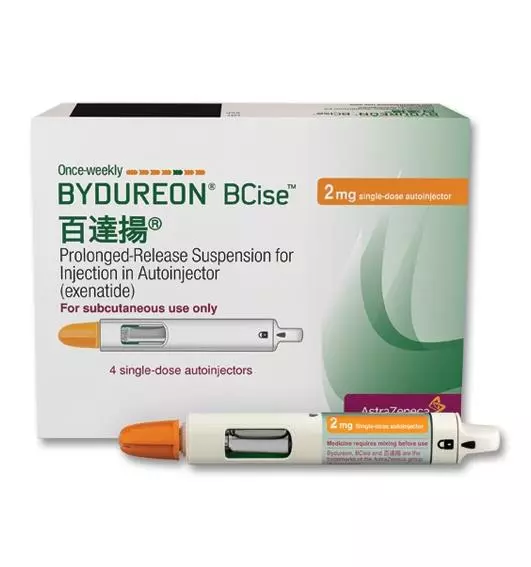Today, the world is facing an epidemic of diabetes. In India alone, the prevalence of type 2 diabetes is expected to rise from about 5% today to almost double that in just 20 years. The burden of this chronic disease is a result of the growing obesity epidemic and sedentary lifestyles.
As a consequence, people with type 2 diabetes struggle to manage their blood sugar levels with medication as well as diet and exercise. Innovative therapies are needed to help these patients manage their blood sugar levels more effectively and thereby prevent complications.
The lead candidate from our Bydureon® portfolio addresses this unmet need by providing once-daily treatment for type 2 diabetes that lowers blood glucose better than existing sitagliptin combined with metformin therapy in patients with inadequate glycemic control on metformin alone.
What is Bydureon?
Bydureon is the trade name of exenatide extended-release injectable suspension, an injectable therapy for the treatment of type 2 diabetes. Exenatide (Bydureon) is a once-daily injectable therapy that mimics the effect of insulin to lower blood glucose in people with type 2 diabetes who are inadequately controlled on metformin. Exenatide is a synthetic peptide that is a member of the glucagon-like peptide-1 (GLP1) receptor agonist class of drugs. Exenatide increases levels of insulin in people with type 2 diabetes by stimulating the pancreas to secrete insulin and increasing the amount of insulin that is released.
Why is it Important?
Exenatide is a once-daily synthetic peptide that mimics the effect of insulin to lower blood glucose in people with type 2 diabetes who are inadequately controlled on metformin. Exenatide is a GLP-1 receptor agonist that is used to treat type 2 diabetes. It is given by injection under the skin. Exenatide is used together with diet and exercise to improve blood sugar control in people with type 2 diabetes. Exenatide may be used alone or together with other diabetes medications, such as insulin and/or sulfonylureas. Exenatide is also used to improve blood sugar control in people with type 2 diabetes who are at risk for needing amputations. Exenatide may lower the risk of dying from heart disease in people with type 2 diabetes.
How does Bydureon Work?

Exenatide is a synthetic peptide that is a member of the glucagon-like peptide-1 (GLP1) receptor agonist class of drugs. Exenatide increases levels of insulin in people with type 2 diabetes by stimulating the pancreas to secrete insulin and increasing the amount of insulin that is released. By increasing insulin levels, exenatide helps lower blood sugar levels. Exenatide is indicated as an adjunct to diet and exercise for the treatment of type 2 diabetes. It is given once daily by subcutaneous injection and is dosed to achieve a fasting blood glucose between 100 and 130 mg/dL.
Manufacturing and Quality of Ingredients
Exenatide has been manufactured in bulk at a WHO-approved facility in India since October 2018. The facility is operated by Exelon Biologics (India) Pvt. Ltd. (EBIPL), a company fully owned by Bydureon’s parent company, Pfizer. EBIPL was granted approval to manufacture the active pharmaceutical ingredient (API) and the finished product by the Drug Controller General of India (DCGI).
This approval enables Pfizer to manufacture Bydureon in India and begin supplying the finished drug to patients in the country. The Bydureon facility in India has passed an annual inspection by the European Medicines Agency (EMA) that considers the Indian regulatory environment comparable to those of other countries, including the U.S. The inspection was done by an expert team from the EMA recruited by the DCGI. As part of the inspection, the EMA team also conducted a mock audit of the manufacturing facility.
The most common side effects reported are nausea, vomiting, abdominal pain and diarrhea. The most serious risk associated with Bydureon is the risk of pancreatitis. Other risks include serious allergic reactions, hypersensitivity reactions, fluid retention, and acute pancreatitis. The risk of developing pancreatitis, pancreatic necrosis or death is increased in patients with a history of pancreatitis. The risk of pancreatitis increases with increasing age, and is higher in smokers. Patients should be informed about the risk of pancreatitis and advised to report signs and symptoms of pancreatitis immediately.
Conclusion: Bydureon BCise: The new way to Treat Type 2 Diabetes
The rise in chronic diseases is a global concern, but particularly so in emerging markets, where the burden of diseases is expected to swell in tandem with the growing middle-class. In India, the prevalence of type 2 diabetes is expected to rise from about 5% today to almost double that in just 20 years.
The condition is characterized by high blood glucose levels that are a result of the body’s inability to produce sufficient insulin or respond appropriately to the insulin that is produced. The treatment of choice is lifestyle modification along with pharmacological intervention.
Innovative therapies are needed to help these patients manage their blood sugar levels more effectively and thereby prevent complications. The lead candidate from our Bydureon portfolio addresses this unmet need by providing once-daily treatment for type 2 diabetes that lowers blood glucose better than existing sitagliptin combined with metformin therapy in patients with inadequate glycemic control on metformin alone.
